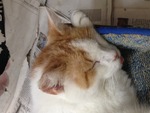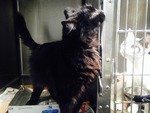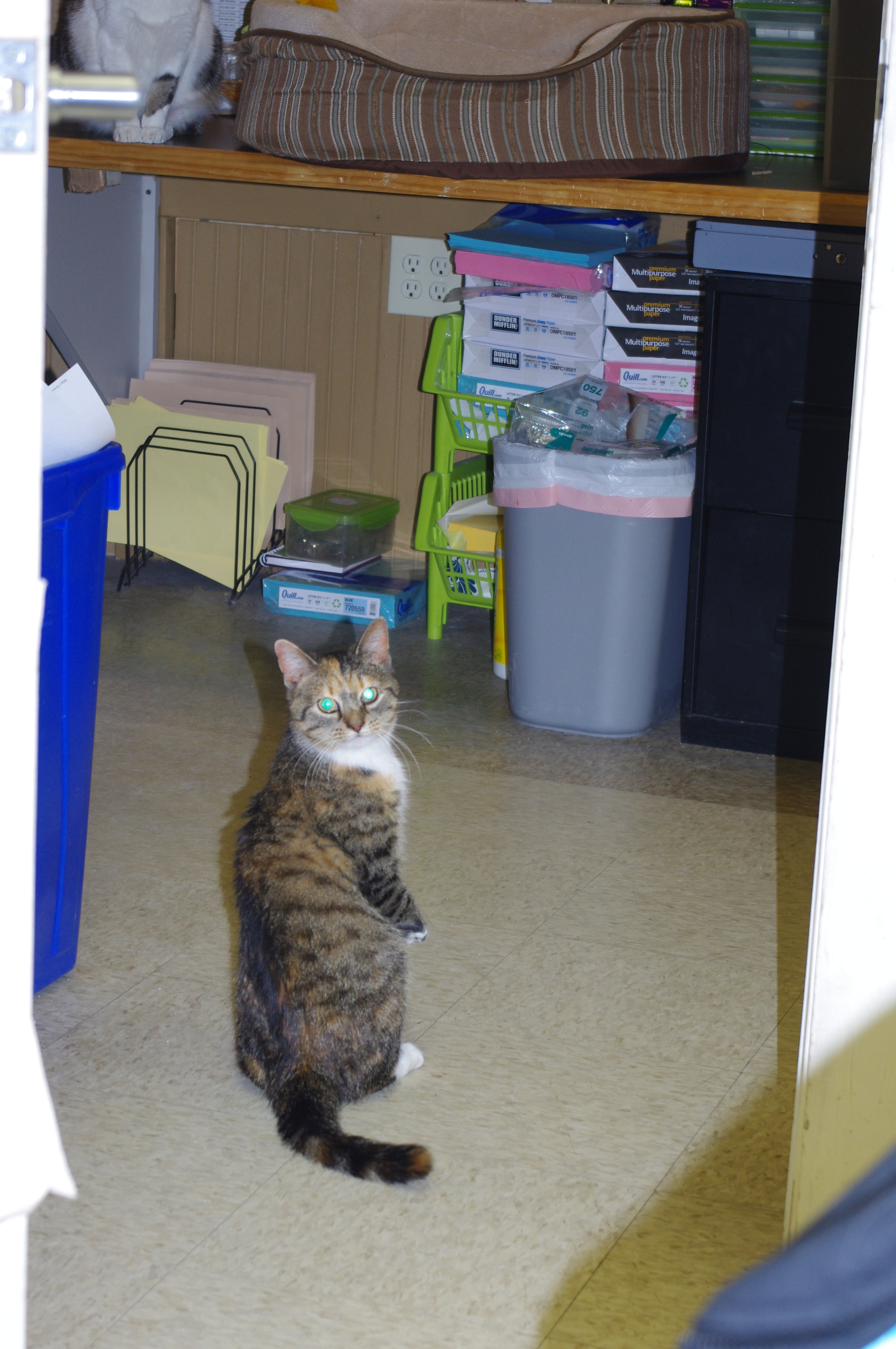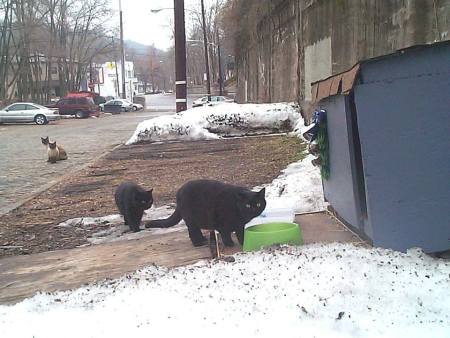Several days ago we took a call from a bird lover, irate over the practice of trap/neuter/return in her neighborhood. A certain cat in her neighborhood was, she claimed, a particularly prolific bird killer, and it was irresponsible of the animal rescues in Cincinnati not to . . . well, kill the cat. The call was similar to the other calls we received from bird lovers: the caller professed, herself, to be a cat lover; the caller feeds the birds - but imagines that to be a very different act than her neighbors feeding cats; she had collected “thousands” of feathers that she would bring to us as evidence of the cat’s sociopathy; she would report us to the Audobon/Facebook/Yelp for our irresponsible handling of the situation. There’s almost a script that these calls follow.
What struck me about the call – as what strikes me with all calls from people concerned about cats killing birds – is the concern not about life in general (as evidenced by her rabid insistence that we kill this cat), but only about very particular lives. In the more than decade I have worked in animal rescue, I have never fielded a complaint about cats killing rats, mice, bats, bugs, lizards, voles, or even pigeons. Indeed, we have people call us specifically looking to adopt cats for their proclivity for killing “pest” animals on their property. The lives that matter, in this case, are the lives of one group: songbirds. The lives that matter are the lives of the beautiful creatures; the melodious creatures; the colorful creatures – the creatures that please our senses and our imaginations. These are the creatures we have defined as pure and guileless, innocent, worthy and important. We make angry phone calls at midnight to protect these creatures, even at the expense of the life of another creature. This life, they tell us, is more important than that life.
The other animals that fall prey to hunting cats, meanwhile, enter our imaginations as pests. They invade our houses, dig up our gardens, get in our food. They spread disease. They kill their young. They’re dirty. They ruin our property (these are, of course, all assignations that came after the prioritization – we ignore the destructive or dirty habits of the animals we like, while placing those behaviors in relief for the animals we don’t. People are quick to point out that raccoons and possums spread rabies – even though this doesn’t hold up to statistical scrutiny per the CDC – but seldom will call the police or shelter in a panic over avian cholera, pox, salmonella, or influenza, all able to be spread by wild birds). The calls we make about these creatures are to the exterminator. And, when cats fall into this “pest” category (for killing our beloved songbirds), we want them killed, too. There will be nary a word from the songbird lovers about the mass extermination of any other animal, including the overwhelming loss of the lives of cats and dogs in shelters. The angry calls about birds are not an expression of compassion for life; they’re not even an expression of environmental concern. These calls are an expression of bias, of a preference for and prioritization of lives that are specifically of interest and beauty to us.
Of course, the predator also falls into this hierarchy of lives. We don’t get angry calls when someone hits a bird with their car; when birds run into the windows of the new house built in their mating territory; when birds’ nesting sites suddenly become the perfect place for a new coffee shop. When the lives at the apex of our priority list – humans – cause the rampant destruction, there are no righteously indignant phone calls demanding someone pay with their head.
Lives should matter in equal measure. The idea that some lives matter more – that the pretty ones, or the sweet-sounding ones, or the delicate ones – is hugely problematic not only for how we treat animals, but for how we treat people.*
When you make that angry phone call, demanding that we kill a cat for you, please know: we love birds, too. We rescue birds who have been hit by cars (our president has missed meetings doing this very thing). We recognize their unique beauty (our shelter director and our community cats director go on annual birding trips). We mourn their loss, and we are working – hard, and every single day – to reduce the number of free-roaming cats.
But we care about them ALL – we care about the turtle and the squirrel that staff members rescued from roadways this month when they had been hit; the bat that a terrified volunteer, in spite of her fear, insisted be removed from her house humanely; the billions of animals killed for food that our overwhelmingly vegetarian/vegan staff members advocate for; and yes, the cats, even though they hunt other things we care very much about. We care about the lives of creatures that aren’t conventionally pretty, about the ones that don’t serve any purpose for us, about the ones that even creep us out. Most of all, we care about the vulnerable ones. While there is no reliable data for how many birds are killed by cats, we do know this: humans are killing cats in our shelters by the millions every year. So please, when you call us and demand that we kill one more life that isn’t worthy of your consideration, please understand that that life matters very much to us.
*This is all, of course, a none-too-subtle parallel to the priority of certain human lives, in focus now thanks to the “Black Lives Matter” movement. Just as with animals, the taking of some human lives – the lives of those we deem “beautiful” or “delicate” or “pure”– garners more outrage than others. And, just as with animals, the taking of the lives of those who are deemed less important is justified by attributing “pest-like” properties to them – they are criminals, they are unemployed, they use drugs, they arrogantly ignore cops, they are “invasive species” (aka “illegals”), they are a threat to the beautiful lives. At the same time, we ignore or explain away those very same properties in the beautiful lives. Criminality becomes “mental illness,” drug use becomes “recreational,” riots becomes “community celebrations,” just as we ignore or explain away the “pest” properties of beautiful birds.
 Thursday, September 17, 2015 at 02:20PM
Thursday, September 17, 2015 at 02:20PM  When an old cat comes to our doors, we worry. We don’t worry about their health; their gnarled toes, frumpy coats, and ragged meows attest to their steadfast ability to survive what life has thrown at them. We don’t worry about their safety; we know, once they come to OAR, they will be warm, fed, and safe. We don’t worry about the heartbreaking circumstances that led them to be homeless and alone, left to fend for themselves as old cats on the street, with OAR as their last hope – the stories are often awful, but at least it’s behind them.
When an old cat comes to our doors, we worry. We don’t worry about their health; their gnarled toes, frumpy coats, and ragged meows attest to their steadfast ability to survive what life has thrown at them. We don’t worry about their safety; we know, once they come to OAR, they will be warm, fed, and safe. We don’t worry about the heartbreaking circumstances that led them to be homeless and alone, left to fend for themselves as old cats on the street, with OAR as their last hope – the stories are often awful, but at least it’s behind them. ho is set in their ways; who sleeps a lot; who complains; and who is stubbornly devoted to their routine. It means bypassing those fluffy, silly, adorable kittens, and choosing a cat that’s more craggy than cute.
ho is set in their ways; who sleeps a lot; who complains; and who is stubbornly devoted to their routine. It means bypassing those fluffy, silly, adorable kittens, and choosing a cat that’s more craggy than cute.

